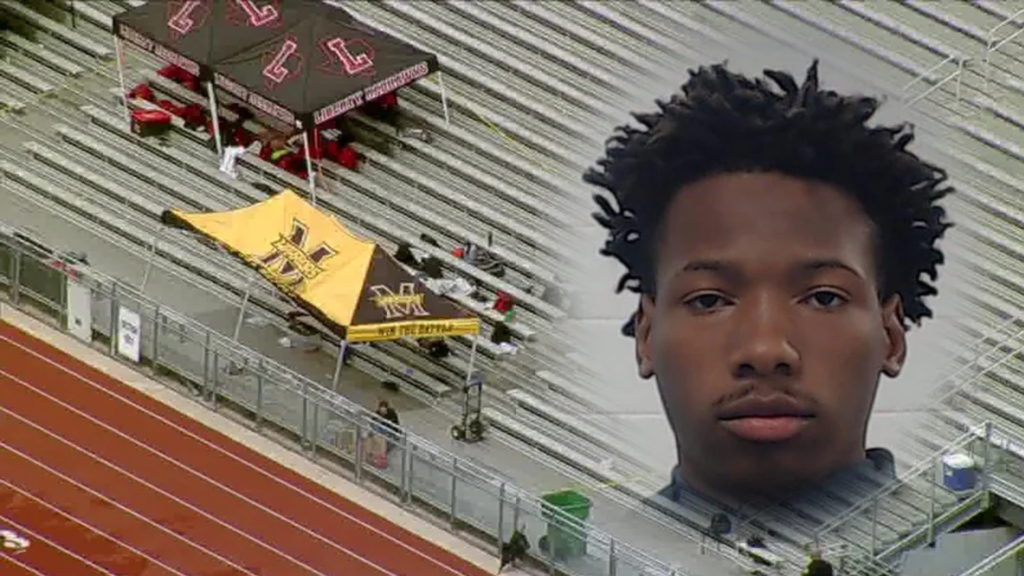
Karmelo Anthony’s family plans to use part of GiveSendGo $415,000 legal defense fund not only to fight the charge, but also to relocate and hire private security following a wave of threats and harassment.
Anthony appeared in court on Monday wearing a gold jumpsuit, shackled and handcuffed, as his legal team successfully argued to have his bond reduced from $1 million to $250,000.
Under Texas law, families typically only need to pay 10% of the bond amount, meaning Anthony could be released from the Collin County Jail soon.
Once released, he will be placed under house arrest, be required to wear an ankle monitor, and must receive permission from the court before leaving his parents’ home.
During the bond hearing, prosecutors pressed Anthony’s father, Andrew Anthony, about the more than $415,000 raised on the Christian crowdfunding site GiveSendGo.
Prosecutors questioned why those funds hadn’t already been used to secure the teen’s release. Andrew Anthony responded that the money was designated for legal fees, but also admitted the family intended to use a portion of the donations to move to a new home and pay for security following threats they’ve received since the incident.
According to the family’s spokesperson, the threats began after their address was leaked online. The messages included racist and violent content, such as images of Black children with knives embedded in their heads. These threats, the family says, have created a hostile and dangerous environment, especially for Karmelo’s younger siblings.
Defense attorney Michael Howard defended the family’s decision not to use the funds immediately for bond. “It would be disingenuous to say there isn’t money,” Howard said. “But it is not a bond fund. This family needs to be able to survive.” He added that between private security costs and the need to relocate for safety, the use of the funds was justifiable.
Howard also reiterated Anthony’s claim of self-defense, saying, “Every Texan has a right to defend themselves when they reasonably fear for their life. Self-defense is a protection that applies to each and every one of us. There are two sides to every story.”
The fatal incident occurred on April 2 during a UIL District 11-5A track meet at Kuykendall Stadium in Frisco. According to the arrest affidavit, the confrontation began when Metcalf, a junior at Memorial High School, approached Anthony, a student at Centennial High School, who was reportedly sitting under the Memorial team’s tent.
Witnesses said Metcalf asked Anthony to move, prompting Anthony to reply, “Touch me and see what happens.” When Metcalf allegedly pushed him, Anthony pulled a knife from his bag and stabbed him once in the chest. Metcalf died shortly after, in the arms of his twin brother, Hunter.
Anthony was arrested at the scene. A school resource officer reported that Anthony told him, “I was protecting myself” and asked whether the incident could be considered self-defense. He also reportedly said, “He put his hands on me.”
While the defense continues to present Anthony as a responsible student and athlete with no prior criminal history, prosecutors highlighted a previous incident at Anthony’s school in February.
While details remain vague, it was described as an “altercation,” though law enforcement was not involved. Prosecutors raised concerns about Anthony’s character and the justification for reducing the bond, arguing that bringing a knife to a school event was premeditated and unnecessary.
Andrew Anthony testified that his son had no criminal history, was an A student, and served as captain of both his school’s football and track teams. He also held two part-time jobs, one at Foot Locker and another at H-E-B, a regional grocery chain.
The family, originally from Baton Rouge, Louisiana, had moved to Texas for a better life. The father also shared that he had taken a leave of absence from his job as a finance manager at a local dealership following the incident.
The killing of Austin Metcalf has shaken the Frisco community and sparked debate nationwide. Judge Angela Tucker, who presided over the bond hearing, noted the heightened emotions surrounding the case and the unprecedented security concerns the court has had to manage.
She emphasized that the purpose of bond is to ensure a defendant returns to court and to maintain community safety—not to punish the accused.
Judge Tucker also clarified that the bond hearing was not the trial and that not all evidence is considered at this stage. She stated that another judge will be randomly assigned to oversee the trial, which has not yet been scheduled.
Because Anthony is a minor, he is not eligible for the death penalty or life without parole if convicted. The case remains under investigation, and both sides have called for calm as the legal process moves forward.

